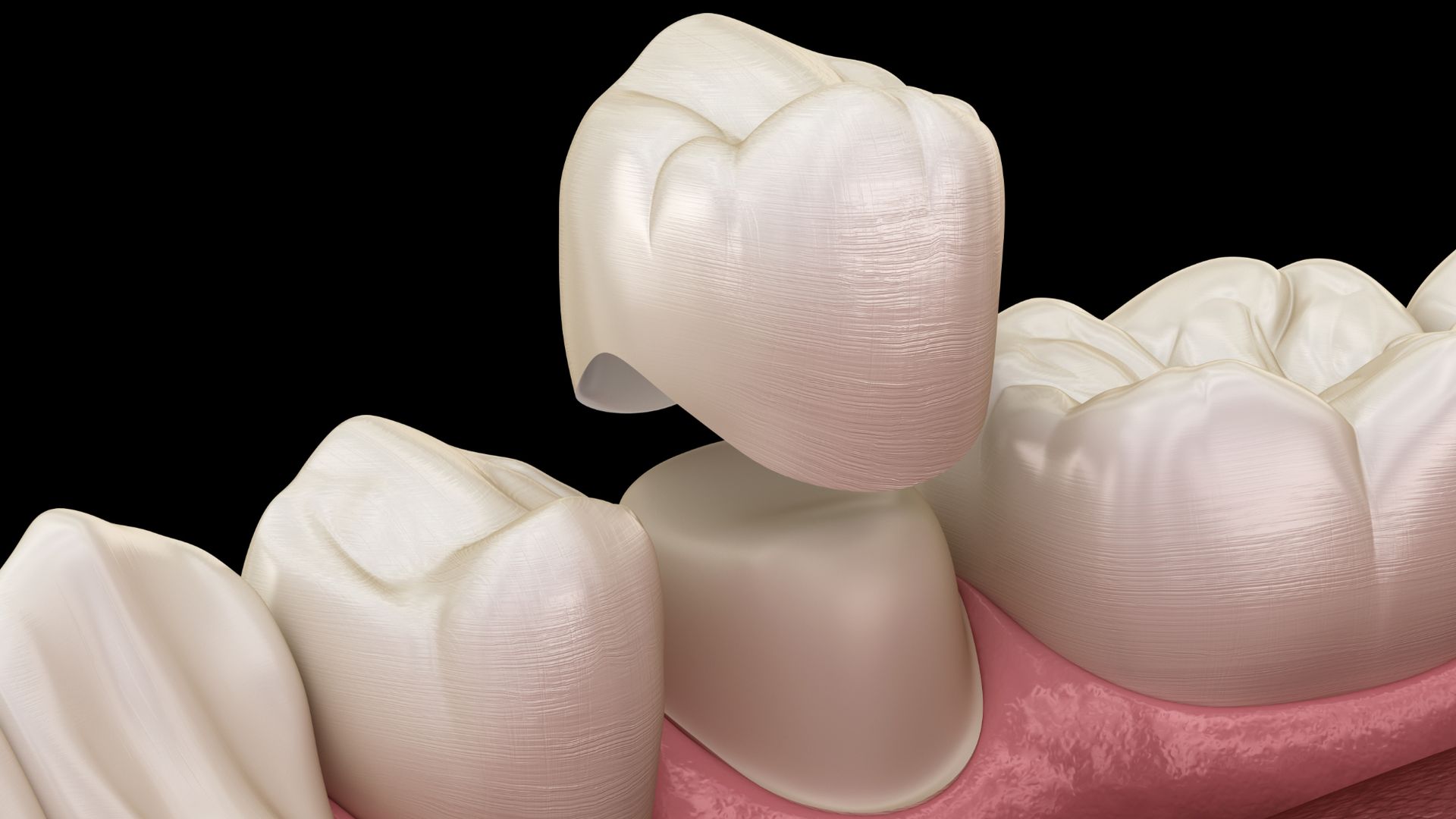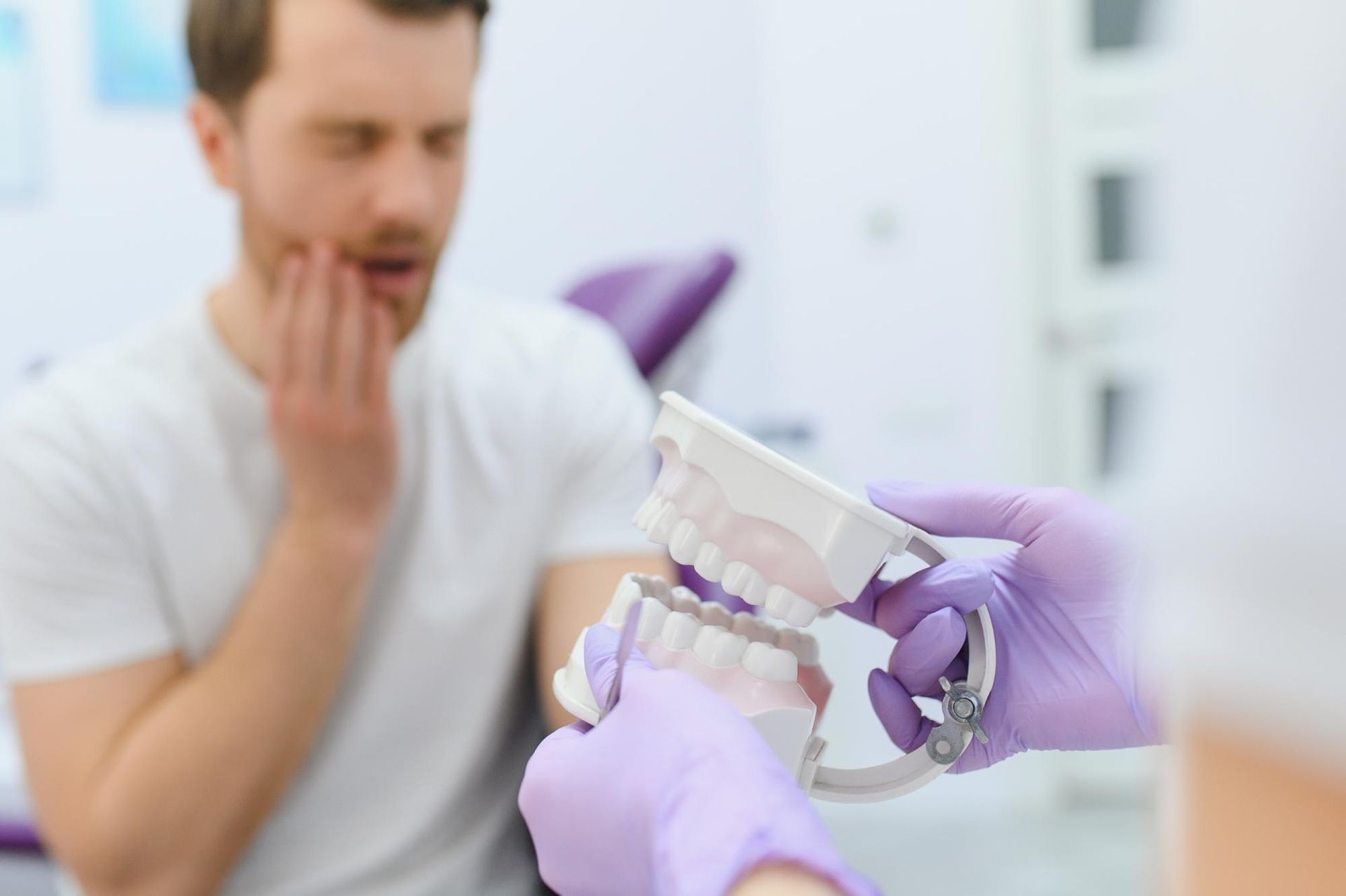15511 N Florida Ave, Tampa, FL 33613, United States of America
The Best Solutions for Bottom Teeth Implants: Stability, Comfort, and Confidence

12 Minute Read
Bottom teeth implants replace missing teeth on the lower jaw, providing a stable, natural-looking solution that restores functionality and confidence. This article covers what bottom teeth implants are, their benefits, the procedure involved, and tips for care.
Key Takeaways
- Bottom teeth implants are titanium-based prosthetics that restore functionality and aesthetics by mimicking natural teeth, crucial for oral functions like speaking and eating.
- The procedure for bottom teeth implants involves several stages, including an initial consultation, implant surgery with osseointegration, and the final placement of a custom-made crown.
- The success rate of bottom teeth implants is high at around 95%, but relies on factors such as jawbone density, oral hygiene, and the skill of the oral surgeon.
Understanding Bottom Teeth Implants
Bottom teeth implants are essentially prosthetics designed to replace missing teeth on the lower jaw, offering a lifeline to those who have lost their teeth and seek a reliable solution. These implants look and function just like natural teeth, thanks to a titanium post that acts as a tooth root and is embedded into the jawbone. Once the implant site heals, a custom-made crown is placed atop this titanium post, seamlessly mimicking natural teeth.
The primary role of bottom teeth is to facilitate essential oral functions such as speaking and eating. Losing these teeth can severely impact one’s ability to perform these functions effectively. Moreover, bottom teeth implants not only restore functionality but also significantly improve the aesthetic appeal of your smile, boosting overall confidence.
Anchored into the jawbone with a sturdy titanium post, bottom teeth implants offer a stable and permanent solution for tooth loss. They replace missing teeth on the lower jaw, allowing you to chew, speak, and smile confidently. This stability is vital for preserving jawbone integrity and preventing further dental issues.
Benefits of Bottom Teeth Implants
Bottom teeth implants offer more than just a captivating smile. A key advantage is their ability to maintain bone density by mimicking natural tooth roots, which stimulate the jawbone and prevent bone loss. This helps preserve the structural integrity of the jaw and overall oral health.
Besides preserving bone density, bottom teeth implants restore vital oral functions like eating, speaking, and smiling. They enable you to enjoy your favorite foods comfortably and speak clearly, improving both social and professional interactions. Additionally, their natural appearance enhances your smile, boosting your confidence.
These implants integrate seamlessly with your natural teeth, providing a teeth implants reliable and durable solution. They exemplify advancements in restorative dentistry, offering an efficient way to replace missing teeth and restore both function and aesthetics with an artificial tooth.
The Procedure for Bottom Teeth Implants
The journey to getting bottom teeth implants involves several stages, starting from the initial consultation and planning, progressing through the implant surgery and healing period, and culminating in the attachment of the custom-made crown.
Each step is crucial for ensuring the success and longevity of the implant.
Initial Consultation and Planning
The process starts with an initial consultation, where a comprehensive assessment of the patient’s overall health and dental condition determines their suitability for implants. General dentists often perform these evaluations, but prosthodontists, specializing in dental prosthetics, play a key role in creating and placing the implants.
In this consultation, a detailed evaluation of the jawbone’s condition ensures it can support the implant. The success of the implant largely depends on the jawbone’s health and density. A thorough health assessment also rules out any potential issues that could complicate the procedure.
A personalized treatment plan is then developed to meet the patient’s specific needs. This plan outlines the entire process, from the initial surgery to the final placement of the custom crown, ensuring the most effective and tailored care.
Implant Surgery and Healing
The next step is implant surgery, involving the insertion of a titanium post into the jawbone under local anesthesia. This post acts as the tooth root, providing a sturdy base for the new tooth. Local anesthesia is typically used to minimize discomfort during dental implant procedures.
After surgery, the osseointegration phase begins, where the bone grows around the implant to create a secure foundation. This phase is crucial for the implant’s success, ensuring it integrates well with the jawbone. The healing period can take several months, with a healing cap placed on the implant to allow the gums to heal before attaching the abutment.
Once osseointegration is complete and the gums have healed, an abutment is placed on the implant. This small connector links the implant to the custom-made crown, which will be attached in the final step.
Attaching the Custom Crown
The final step is attaching the custom-made crown to the implant. Once the gums have healed and the abutment is in place, the custom crown, designed to mimic natural teeth, is securely attached.
This custom made crown resembling restores both the appearance and functionality of the missing tooth, allowing you to chew and speak naturally. This step completes the tooth replacement process, providing a fully functional and aesthetically pleasing smile.
Reliability and Success Rates of Bottom Teeth Implants
Bottom teeth implants boast a high success rate, with studies indicating a five-year success rate of around 95% for implants placed in the lower jaw. This high success rate is influenced by factors such as the density of the jawbone, which provides a sturdy base for the implants, and the patient’s oral hygiene and overall health.
However, certain factors can negatively impact the success of dental implants. Poor oral hygiene, smoking, and infections around the implant site can lead to complications and increase the risk of implant failure. Maintaining good oral hygiene and addressing any signs of discomfort or complications early on is essential.
The skill of the oral surgeon also plays a significant role in the success of the implant procedure. Proper implant positioning and professional expertise can ensure that the implant integrates well with the bone, providing a reliable and durable solution for tooth replacement.
Choosing the Right Professional for Your Implants
Choosing the right professional for your bottom teeth implants is essential to ensure personalized care and minimize discomfort. It is important to review a dentist’s qualifications and experience when selecting a practitioner for implants. Oral surgeons, who specialize in complex implant surgeries, are ideal for difficult cases, while periodontists focus on the health of gums and bone, which is essential for successful implant placement.
Skilled practitioners offer personalized care that addresses patients’ unique needs for their dental implants. For instance, Dr. Keenan Osman, an experienced professional in providing bottom teeth implants, ensures that each patient receives the most effective and tailored treatment.
Choosing the right professional ensures a successful implant procedure, minimizes complications, and achieves the best possible outcome for your dental implants choosing needs.
Post-Procedure Care for Long-Term Success
Proper post-procedure care is crucial for ensuring long-term success and avoiding complications. Patients may initially experience swelling and discomfort, typically resolving within a few days. Daily brushing with a soft-bristle or electric toothbrush is essential to thoroughly clean the implant area and protect dental implants.
Using implant-specific floss or water flossers effectively removes plaque and debris from around dental implants. Rinsing with antimicrobial mouthwash can help reduce bacteria and prevent gum disease. Additionally, dietary choices should avoid hard or sticky foods that can damage dental prosthetics or exert excessive pressure on implants.
Addressing any signs of discomfort or complications early can prevent more serious issues and contribute to the longevity of the implants. Following these post-procedure care guidelines ensures the long-term success of your bottom teeth implants, allowing you to enjoy a healthy, functional, and attractive smile.
Summary
Bottom teeth implants offer a revolutionary solution for those who have lost their bottom teeth, providing a reliable and permanent tooth replacement option. With benefits ranging from maintaining bone density to restoring essential oral functions and enhancing aesthetics, these implants can significantly improve one’s quality of life. By understanding the procedure, choosing the right professional, and following proper post-procedure care, you can achieve a successful and long-lasting result. Smile confidently and embrace the transformative power of bottom teeth implants.
FAQ
Frequently Asked Questions About Bottom Teeth Implant
-
What are bottom teeth implants?
Bottom teeth implants are prosthetics created to replace missing teeth in the lower jaw, offering a permanent solution that closely resembles the function and appearance of natural teeth.
-
How do bottom teeth implants help maintain bone density?
Bottom teeth implants help maintain bone density by mimicking natural tooth roots, stimulating the jawbone, and preventing bone loss. This action helps preserve the overall structure and health of the jaw.
-
What is the success rate of bottom teeth implants?
The five-year success rate for bottom teeth implants is approximately 95%, contingent on factors such as oral hygiene, overall health, and the proficiency of the oral surgeon. Therefore, maintaining good oral care is essential for optimal outcomes.
-
How do I choose the right professional for my implants?
To choose the right professional for your implants, review their qualifications and experience, and consider consulting specialists such as oral surgeons or periodontists who specialize in implant surgeries and gum health. This approach ensures you receive the highest standard of care for your dental needs.
-
What post-procedure care is required for dental implants?
To ensure the longevity of your dental implants, it is essential to practice daily brushing with a soft-bristle or electric toothbrush, use implant-specific floss or water flossers, rinse with antimicrobial mouthwash, and avoid hard or sticky foods. These measures will aid in maintaining oral hygiene and promoting healing.




CONTACT TAMPA'S DENTAL IMPLANT EXPERTS
Get The Smile You've Been Dreaming of Today
We offer affordable financing options for all your implant needs, get started with us today by claiming your Free Implant Consult Package!

Other Ways to Contact Us
Get Your Free Dental
Implant Consult Package
Get your First Consultation, Panoramic X-Rays, & Treatment Plan with our head dentist for FREE to see if you qualify for implant treatment. Everything you need to get started transforming your smile. $397 Value. Please note, dental implants are NOT covered by Medicare or Medicaid.
Reserve Your Spot Today - Limited Availability Every Month

Dental Implants
Quick Links
Contact Information
tampadentalimplants@gmail.com
15511 N Florida Ave, Tampa, FL 33613, United States of America
All Rights Reserved | Tampa Dental Implants








